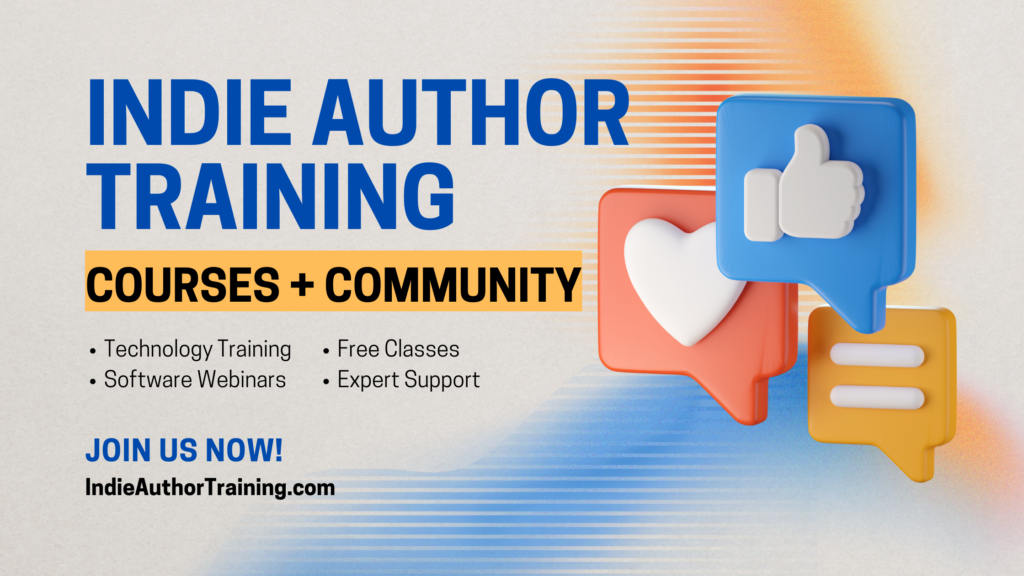One of the many things I admire about the indie author community is how they are of the mindset that there is enough pie for all of us. Because of this, when an indie author has information that can assist another author, they step in and share it. One of those helpful people is Robyn Wideman.
Before I get ahead of myself, let me introduce Robyn. He writes teen High Fantasy, LitRPG, and GameLit, all with elements of Science Fiction. In addition to being an author, he is a publisher under his Magicblood Media brand.
The first time I met Robyn, we were at a pre-pandemic conference/writers retreat. A group of roughly 150 authors was holed away for six days. We had two days to build friendships that endured distance. When we weren’t talking about our real worlds, we added words to our fictional ones. Then came two days of learning about the business, followed by two days of writing. At this point, the group of authors was friends. We wrote a little and talked a lot about how to apply what we learned at the conference.
In one of these collaborative learning sessions, I was lucky enough to have Robyn explain how to read reports and use the information. It was just enough information to apply the newfound knowledge, knowing there was more to learn. Thankfully, three years later, Robyn was willing to answer the questions I didn’t know to ask and answered them from the perspective of his role as a publisher.
The Beginnings of Robyn’s Author Journey
Before Facebook groups, indie authors and aspiring authors discussed the market on Amazon Kindle’s KBoards. Robyn spent his time there learning all he could about the publishing industry. “The hard lessons that usually come from experience, I learned for free from authors who shared what they knew.” They taught him about promo launches and the importance of blurbs, covers, and keywords. When he had a grasp on how to be a successful indie author, he tested the waters.
On April 15, 2015, he published a couple of shorter stories. After the stories proved that Robyn had a viable product, he published The Son of Soron and The Missing Mage. The rapid release launch of the two coming-of-age Fantasies took place days after each other, holding control over a promise Robyn made to himself. When he reached fifty dollars a day in sales, he’d quit one of his two day jobs because that meant his writing was working. Within a week, the sales surpassed his goal. Then he set another benchmark to help him decide which job to leave. Once again, he went above and beyond what he set. Within a month of his launch, Robyn quit both jobs. Both titles are still in the top 100 of their categories today.
What Does Writing Look like as a Publisher?
As a publisher, Robyn helps his authors maintain the structure while allowing authors to explore their creativity. His feedback for ideas is always based on whether the publishing company could sell it.
Using a philosophy of “It is way easier to write a book to an audience than it is to find an audience for your book,” Robyn uses metadata to determine if a book will sell. For example, when someone approaches him with a story, his first question is, “What are the keywords?” When an author can give that information, they prove there is an audience for the story they want to tell.
As a Publisher, Do You Work More as a Plotter or Pantser?
Robyn prefers writing within a hybrid organization system. He starts the story with a plotline and lets the story grow from there. “When writing a Fantasy series, an organized plotline keeps the story consistent,” Robyn says. Otherwise, the author could end up in a situation where the character uses one spell type in one book and a different spell in a subsequent book in the series. “Keeping an up-to-date spreadsheet is critical to making writing in series not a brain buster.”
In other words, a semblance of an outline is necessary. “However,” Robyn added, “with that being said, if someone comes up with a cool idea that doesn’t fit with the outline, I’ll make the outline fit the cool idea. As an author, we have to know when to pivot. Authors are organic creators. Even as they are typing the story, new ideas are flowing.”
Is Navigating the Market as a Publisher Different than as a Writer?
Robyn’s passion, especially as a publisher, is metadata. This was the add-on to what he was trying to explain to me all those years ago. He also explained that metadata is necessary because readers aren’t looking for authors until they are familiar with their work. They’re looking for a certain type of book. “The metadata presents your story in a way that says my book is what you’re looking for.”
We have control over the metadata on the Amazon dashboard. “The seven keywords are what Amazon uses to put your book in front of the reader. It will do more for you than spending money on ads. You can find the ones to use in Publisher Rocket.” He added that authors can also use the search bar on Amazon. “You can type the first terms. After that, Amazon will supply options by auto-filling with suggestions. The algorithm predicts what you’re looking for.”
This method also applies to market research for writing. As a publisher, Robyn is interested in the stories people are looking for. He searches for keywords, character types,and tropes. In particular, he looks at how many people are searching for that information and how many authors are writing to meet the need. Through the research, he can piece together what story readers want.
After the aha moments, he explained the process using terms we’ve heard. “People call it ‘write to market.’ I call it finding out if there is an audience for the story.”
How Do You Look at Formatting?
As far as formatting is concerned, it is one of the simplest aspects of publishing. Within their site, Amazon offers help for the author with the finished product. He explained that formatting an e-book is roughly a thirty-second process. Paperbacks require a little more attention to different details like margins. “And there are lots of great software options like Vellum and Atticus that make formatting paperbacks much easier,” Robyn says.
What confuses those new to indie publishing is that books are art. This is why, where formatting is concerned, many standards are tied to preferences. So different authors ascribe to different methods. “For instance, some will use italics when a character communicates telepathically while others use dialogue tags. There is no rule.” With that said, Robyn recommends reviewing tables and images on different devices before publishing, especially with e-readers. On one device, the image meant to enhance the reading experience can interfere with the reader’s ability to read clearly because it covers the text or isn’t fully on the screen.
He closed the topic, reiterating that new authors should visit the help pages on Amazon. “They have great resources for formatting.”
How Can an Author Provide Readers Extra Value?
“Extra value is inconsequential if the reader is getting value,” Robyn says. “The end result is the same if, when they put the book down, they’re super excited for the next book and are looking for it already. If I’ve created a world that they’re excited about and want to read, I’ve given them something they value. I’m not looking to give extra value. I’m looking to give the reader something they really want.”
He continues, “I think you’re better off writing the best book you can and selling it to as many people as you can. There’s no extra in that. It’s literally all or nothing.”
What Does Success Mean to You?
“As an author, writing something that my readers will enjoy,” Robyn says. “As a publisher, my success comes when I’m able to sell that story and get high rankings, especially when I’m working with other authors.”
The conversation slowed to favorite reads, movies, and hopes for the future. Even then, like the authors who helped him years ago, Robyn was forthcoming with information that would help authors new and experienced. He said, “Here’s a little tip. Whatever is hot on TV will sell in books too.” People will see a movie or a great television program and want to extend the experience. They can do this with books we write with the help of metadata.
I had to chuckle because he is an intuitive publisher, and looking at the tip from the perspective of a rabid reader, I knew he was right.






